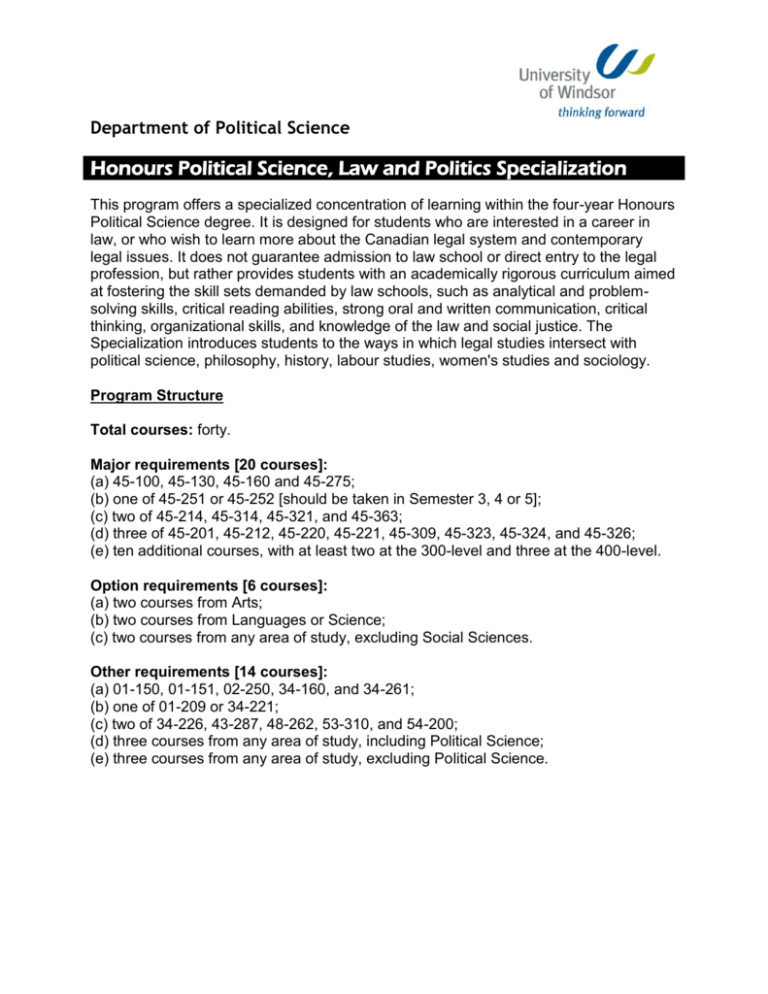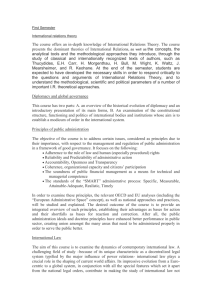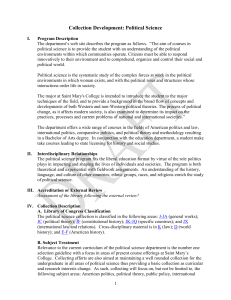Honours Political Science, Law and Politics Specialization
advertisement

Department of Political Science Honours Political Science, Law and Politics Specialization This program offers a specialized concentration of learning within the four-year Honours Political Science degree. It is designed for students who are interested in a career in law, or who wish to learn more about the Canadian legal system and contemporary legal issues. It does not guarantee admission to law school or direct entry to the legal profession, but rather provides students with an academically rigorous curriculum aimed at fostering the skill sets demanded by law schools, such as analytical and problemsolving skills, critical reading abilities, strong oral and written communication, critical thinking, organizational skills, and knowledge of the law and social justice. The Specialization introduces students to the ways in which legal studies intersect with political science, philosophy, history, labour studies, women's studies and sociology. Program Structure Total courses: forty. Major requirements [20 courses]: (a) 45-100, 45-130, 45-160 and 45-275; (b) one of 45-251 or 45-252 [should be taken in Semester 3, 4 or 5]; (c) two of 45-214, 45-314, 45-321, and 45-363; (d) three of 45-201, 45-212, 45-220, 45-221, 45-309, 45-323, 45-324, and 45-326; (e) ten additional courses, with at least two at the 300-level and three at the 400-level. Option requirements [6 courses]: (a) two courses from Arts; (b) two courses from Languages or Science; (c) two courses from any area of study, excluding Social Sciences. Other requirements [14 courses]: (a) 01-150, 01-151, 02-250, 34-160, and 34-261; (b) one of 01-209 or 34-221; (c) two of 34-226, 43-287, 48-262, 53-310, and 54-200; (d) three courses from any area of study, including Political Science; (e) three courses from any area of study, excluding Political Science. Suggested Program Sequencing Year 1 [Semester 1] 01-150. Foundations of Academic Writing I 45-100. Introduction to Canadian Politics 45-130. Comparative Politics or 45-160. World Politics One 'Option requirement' course One 'Other requirement' course Year 3 [Semester 5] 45-XXX. Political Science course 45-XXX. Political Science course 45-XXX. Political Science course One 'Option requirement' course One 'Other requirement' course Year 1 [Semester 2] 01-151. Foundations of Academic Writing II 45-130. Comparative Politics or 45-160. World Politics 45-XXX. Political Science course One 'Option requirement' course One 'Other requirement' course Year 3 [Semester 6] 45-XXX. Political Science course 45-XXX. Political Science course One 'Option requirement' course One 'Other requirement' course One 'Other requirement' course Year 2 [Semester 3] 02-250. Basic Quantitative Methods 45-XXX. Political Science course 45-XXX. Political Science course 34-160. Reasoning Skills One 'Option requirement' course Year 4 [Semester 7] 45-3XX. Political Science course 45-3XX. Political Science course One 'Option requirement' course One 'Other requirement' course One 'Other requirement' course Year 2 [Semester 4] 45-275. Introduction to Research Methods 45-XXX. Political Science course 45-XXX. Political Science course 34-261. Informal Logic: Argumentation One 'Other requirement' course Year 4 [Semester 8] 45-4XX. Political Science course 45-4XX. Political Science course 45-4XX. Political Science course One 'Other requirement' course One 'Other requirement' course COURSE DESCRIPTIONS – MAJOR REQUIREMENTS 45-100. Introduction to Canadian Government and Politics An introduction to the politics and government of Canada. The course will focus on political culture, the constitution, federalism, the executive, parliament, public service, courts, political parties, interest groups, and elections. 45-130. Comparative Politics in a Changing World Introduces students to issues such as democracy, authoritarianism, nationalism, political culture, and how political power is organized. The course focuses on the democratic states of the West, but also examines non-democratic states such as China and the transitional democracies of Eastern Europe. 45-160. Issues in World Politics An examination of competing perspectives on international relations and of such critical themes as power, security, war, imperialism, nationalism, interdependence, development and underdevelopment, human rights, environmental concerns, and the quest for a new world order. 45-275. Introduction to Research Methods Introduces students to quantitative and qualitative social research. Looks at how surveys and focus groups are used and abused for political and commercial purposes. Examines what field and archival research can teach us about human behaviour and social, political, and economic trends. 2 One of: 45-251. Classical Political Thought An introduction to the history of political thought from the ancient Greeks to the end of the Middle Ages. Topics may include human nature, justice, natural law, and the relationship between Church and State. 45-252. Modern Political Thought Toward the new science of politics from Machiavelli to Rousseau and the French Revolution. Two of: 45-214. Legal Process in Canada An introduction to the legal system in Canada, including the sources of Canadian law, the general concepts of constitutional and administrative law, the court structure, and the study and practice of law. (Prerequisite: one of 45-100 or 45-130.) 45-314. Constitutional Law and Politics in Canada The nature and purpose of constitution and major issues in Canadian constitutional politics. Topics may include judicial review, the development of human rights law in Canada, and the impact of the Charter of Rights on Canadian politics and government. 45-321. The Legislative Process An introduction to representative democracy, parliamentary behaviour, and legislative process. May include role-playing exercises and a simulation of the Federal House of Commons. 45-363. Principles of International Law An introduction to the role of international law in international relations, this course will consider the role of justice in the international system and will examine the basic principles of modern international law, including sources, subjects, and procedures. Three of: 45-201. Current Issues in Canadian Politics An examination of one or more current issues in Canadian politics, for example, energy and resources, the environment, native peoples, aging, women's rights, urban problems, and health care. 45-212. Environmental Policy and Politics The course examines the domestic and international context of environmental policy-making in Canada. Topics examined may include global warming, Great Lakes pollution, and endangered species. 45-220. Introduction to Public Administration This course introduces students to the political science sub-field of public administration. Building on classical theories of organization, it examines the institutions of government, the dynamics of public sector management, and the relationship between elected officials and administrators in the political system. 3 45-221. Canadian Public Administration and Policy An introduction to the processes of public policy formation in Canada. Includes an analysis of political/bureaucratic relationships, decision making theory, and the role of interest groups in the context of selected contemporary policy issues. 45-309. Canadian Provincial Government A comparative study of provincial governments and politics in Canada including an examination of the powers exercised by provinces, the institutions of provincial government and the behaviour of provincial electorates and politicians. In given terms, Ontario, Quebec, the Atlantic or the Western provinces may be given particular attention. 45-321. The Legislative Process An introduction to representative democracy, parliamentary behaviour, and legislative process. May include role-playing exercises and a simulation of the Federal House of Commons. 45-324. Public Infrastructure This course examines the role of the public sector in the ownership and operation of major capital facilities for transportation, water, sanitation, electric power, health care and education. Topics include alternative funding mechanisms, environmental impacts and regulations, public consultation and the influence of political interest groups, and the role of infrastructure in the economy. The course also provides an introduction to analytical methods used to support infrastructure decision-making. 45-326. Local Government An introduction to the politics and administration of local government. Topics include local political structure, relationships between municipalities and other levels of government, public policy-making, and current challenges facing local officials. COURSE DESCRIPTIONS – OTHER REQUIREMENTS 01-150. Foundations of Academic Writing I A basic course designed to develop effective writing skills for communicating ideas in academic and other contexts. Topics will include: grammar; the audience; the writing process; conventions of different paragraph prose forms. This course is structured as an on-line course (Not Distance Education), and is not an ESL course. There will be on-campus mid-term and final exams. 01-151. Foundations of Academic Writing II A basic writing course designed as a follow up to 01-150. This course aims to develop and refine effective writing skills for communicating ideas in academic and other contexts. Topics will include a cursory review of grammar; writing processes; and conventions of different prose forms in various scholarly disciplines. The main content of the course is paragraph and essay writing, basic research skills, and forms of scholarly citation. This course is structured as an online course (Not Distance Education). There will be on-campus midterm and final exams. 02-250. Basic Quantitative Methods in the Social Sciences Introduction to measurement of variables, organization and description of numerical data, testing hypotheses, inference, and interpretation of findings in the Social Sciences. Topics include descriptive statistics, normal distribution, probability, sampling, hypothesis testing, ttests, correlation, and chi-square tests. 4 34-160. Reasoning Skills An explanation of, and practice in, the basic knowledge, skills and attitudes which are essential components of reasoning well. 34-261. Informal Logic: Argumentation The objective is to develop the ability to analyze and evaluate extended arguments found in the public media, books and articles, and to construct a well-argued case. Two of: 34-226. Law, Punishment and Morality An introduction to the philosophical issues related to understanding the nature of law and legal obligation, the relation between law and morality, and the purpose of punishment. The theoretical points and distinctions will be illustrated by their applications to particular current issues. 43-287. History of Crime Examines the ways in which crime and criminal justice were shaped by the societies in which they occurred and the ways in which they changed as these societies changed. 48-262. Law and Social Order This course will examine the creation and administration of law and justice. Topics may include: legal systems, legal and justice professionals, civil and criminal law, courts and sanctions. Focus of the course will vary by instructor. 53-310. Women and the Law This course examines the relationship between gender inequality and the legal system. Topics include abortion, marriage, divorce, custody, equal pay, sexual harassment, rape, pornography, and prostitution. Students are introduced to basic legal research tools, such as statutes, regulations, cases, and legal literature. 54-200. Labour Law and Policy An interdisciplinary examination of the relationship between the state, law, and labour unions. This course examines the role of the state and labour law in shaping and mediating the relationship between labour and employers. The impact of laws in labour relations, employment standards, workers' compensation, human rights, and occupational health and safety are examined. 5








